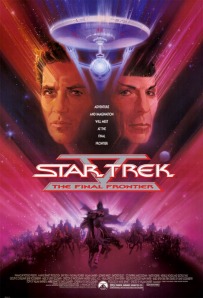Today’s guest post is brought to us by Mike Poteet. Mike is someone who I met through this blog. He has been a faithful reader and commenter for a few years now. I appreciate the way Mike combines thoughtful theology with some of his favorite nerdclinations. You can follow him on Twitter or check out more of his writing at the Sci-Fi Christian.
This June, Star Trek fans celebrated—well, maybe just “marked”—the twenty-fifth anniversary of Star Trek V: The Final Frontier. Time has not been on this movie’s side. Last fall, Scott summed up most folks’ feelings when he said it “wasn’t great.” This year, Wired magazine’s Graeme McMillan, was less charitable, dubbing it “an uneven, overly complicated mess.”
I won’t pretend Star Trek V is my favorite Trek film. (That’s Star Trek II: The Wrath of Khan, and here’s thirty reasons why.) I won’t deny it has many cringe-inducing elements. A force field-protected planet at the galactic center—really? Captain Kirk takes a badly bluescreened tumble off a mountain—this is exciting? The franchise’s first big-screen Romulan, Caithlin Dar, looks and acts nothing like a Romulan—why bother? At one point, our heroes’ plan for getting past bad guys hinges upon Uhura doing a fan dance in the buff—huh?
But Star Trek V is better than most people, including Trek fans, allow. As Scott observed, for example, it focuses on the Enterprise crew as friends—not only the classic Trek triumvirate of Kirk, Spock, and McCoy, but also the brotherly camaraderie of Sulu and Chekov, and a previously unknown flirtatious affection between Uhura and Scotty (okay, that’s also kinda weird—but points for trying). For a film frequently derided as evidence of William Shatner’s ego, Star Trek V goes out of its way to showcase the bonds of friendship between all the characters.
I also find Sybok compelling, thanks to Laurence Luckinbill’s masterful, magnetic performance. I don’t think it odd Spock never mentioned having a half-brother—everyone has secrets (Vulcans more than most). Nor do I have trouble believing a full-blooded Vulcan would rebel against his society’s sometimes stifling adherence to logic in order to reconnect with life’s emotional and spiritual dimensions.
But the film’s theological content interests me most. To be sure, as Scott pointed out, Kirk’s closing comments about God being in the human heart probably don’t refer to the indwelling of the Holy Spirit! But we believe God does live within us (Romans 5.5; 1 Corinthians 6.19; Revelation 3.20), and nothing prevents us from reflecting on Kirk’s “homily” from that conviction.
More impressively, Star Trek V tackles that belief’s potential pitfall. Since we believe God dwells within us, we must remain vigilant against mistaking ourselves for God—of deciding, as did Sybok, that our face suits God best. To his credit, once Spock declares the entity Sybok has been serving is “not the god of Sha Ka Ree, or any other god,” Sybok becomes an iconoclast.
Iconoclasm—the destruction of false images of God—is a major theme in my own, Reformed tradition. My denomination, the Presbyterian Church (U.S.A.), holds as one of its doctrinal standards The Second Helvetic Confession, a Reformed statement of faith from mid-sixteenth century Switzerland. It rejects the use of statues and pictures in Christian worship—“Although Christ assumed human nature,” it says, he did not do so “to provide a model for carvers and painters.” Today, many Reformed Christians have reclaimed the visual arts as good and proper ways to praise God. But we still adhere to the Confession’s insistence that “wherever we turn our eyes, we see the living and true creatures of God which… make a much more vivid impression on the beholders than all the images of vain, motionless, feeble and dead pictures made by men” (Chapter IV). If you want to see God, look first to Jesus as the Scriptures witness to him; then look at the world God loves, and the people God fashioned in the divine image.
On Sha Ka Ree, Captain Kirk calls out “God” not only for needing a starship but also for not knowing him. This can’t be the God praised by the psalm-singer, “who formed my inward parts; [who] knit me together in my mother’s womb” (Psalm 139.13, NRSV).
Dr. McCoy, too, objects: “I doubt any God who inflicts pain for his own pleasure!” He’s a doctor, not a professional theologian, but you don’t need a seminary degree to know God is “merciful and gracious, slow to anger and abounding in steadfast love” (Psalm 103.8, NRSV).
Sybok completes the exposure of this alien as a false god. It is another creature, in great pain (as we all are), unworthy of anyone’s trust or allegiance, but needing compassion. And so Sybok shares its pain, using his empathic and telepathic gifts to give Kirk, Spock, and McCoy a chance at survival.
Re-watch, or watch for the first time, Star Trek V. Yes, you’ll find lots to laugh at. But, in the best Trek tradition, you’ll also find much to think about as you explore the frontier of science fiction and faith.


Dr. McCoy, too, objects: “I doubt any God who inflicts pain for his own pleasure!” He’s a doctor, not a professional theologian, but you don’t need a seminary degree to know God is “merciful and gracious, slow to anger and abounding in steadfast love” (Psalm 103.8, NRSV).
Let me add that God is not just Love but also Holy and will eventually those that reject him to hell. However, given that, He is not willing that any should perish and will not take pleasure in inflicting the pain of Hell on those that go there.